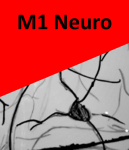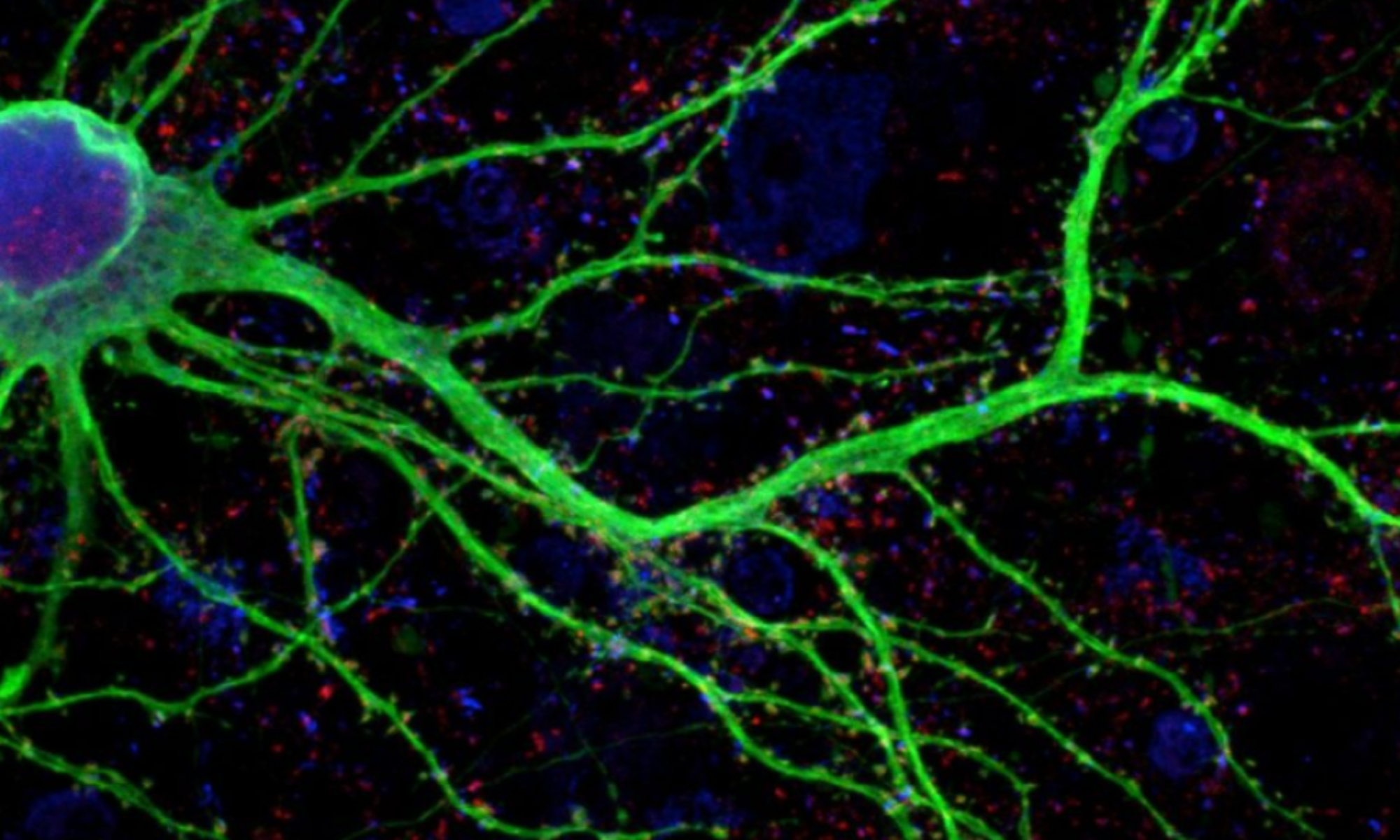
M1 Neuro - Teaching Program
Semester 1 provides solid foundations in the fields of physiology and neurophysiology both in terms of fundamental knowledge and experimental (and analytical) practices. In addition to a 6-week internship, semester 2 offers the student a choice of teaching units allowing him/her to specialize and deepen his/her specific knowledge, from molecular neurobiology to integrated, cognitive, and clinical neurosciences. This format allows the student to prepare more specifically for one of the two Master courses offered in the second year.

First Semester
Disciplinary Courses
Scientific Tools
Properties of neuronal cells
Understanding the biochemical and electrical specificities of the neuronal cells is the first step toward understanding brain function and information processing. Through lectures and practical courses, this teaching unit will describe neuronal activity (genesis, firing patterns, propagation…), synaptic communication and its plasticity, neuronal integration, neuronal metabolism, neuronal differentiation and synaptogenesis and maintenance of the homeostasis of the nervous system thanks to neuron-glia interaction.
More info: Neuron
Responsable/s: Corine AMAT (corine.amat@univ-lyon1.fr) & Marion RICHARD (marion.richard@univ-lyon1.fr)
Behavioral Neurosciences
Examples of topics and models studied : reward circuit & addictive behavior in rodents, social cognition in non-human primates, spatial cognition in rodents and primates, zebrafish…
More info: Behavior
Responsable/s: Anne DIDIER (anne.didier@univ-lyon1.fr)
Cognitive neurosciences & brain imaging
This teaching unit comprises an introduction to Cognitive Neurosciences with lectures dedicated to several high-level functions, such as attention, memory, and decision making in human and non-human primates. The unit has a strong methodological component that allows the students to acquire some basic programming skills and to familiarise with the analysis of fMRI, PET and EEG data.
More info: NeuroCo
Responsable/s: Philippe BOULINGUEZ (philippe.boulinguez@univ-lyon1.fr)
Methodology and Statistics
Responsable/s: Philippe BOULINGUEZ (philippe.boulinguez@univ-lyon1.fr) & Claude DUCHAMP (claude.duchamp@univ-lyon1.fr)
Techniques for empirical research
Responsable/s: Philippe BOULINGUEZ (philippe.boulinguez@univ-lyon1.fr)
Second Semester
Disciplinary Courses
Scientific Tools
Physiology of Neural Networks
The aim of the unit is to provide an in-depth description of the mechanisms underlying the functioning of neural networks, specifically in relation to cognitive functions. This entails examining cellular mechanisms at the level of the neuron/synapse, as well as macroscopic processes governing inter-regional communication at the whole brain level. Examples from a broad range of functions (learning, sleep, olfaction, action control, language…) will serve to illustrate the main methods for studying the physiology of neural networks in the human and non-human brain.
More info: Networks
Responsable/s: Corine AMAT (corine.amat@univ-lyon1.fr) & Philippe BOULINGUEZ (philippe.boulinguez@univ-lyon1.fr)
Clinical Neurosciences
This course will present different neurological and psychiatric pathologies (example: head trauma, stroke, brain tumor, depression, altered states of consciousness, pain, Parkinson’s disease, neurodevelopmental disorders). These pathologies will be addressed from the gene (molecular and cellular mechanisms) to the patient (symptoms) and will include the description of the different therapeutic approaches. The teaching unit will combine lecture, group works and practical courses.
More info: Clinical Neurosciences
Responsable/s: Irene CRISTOFORI (irene.cristofori@univ-lyon1.fr) & Marion RICHARD (marion.richard@univ-lyon1.fr)
Anglais pour la communication professionnelle niveau 1
English course focusing on oral and written communication in the field of Neurosciences. Training comprises the writing of reports and articles, as well as the presentation and discussion of scientific results, both in formal (e.g. conferences) and informal (e.g. lab meetings) situations.
More info: English
Responsable/s: Nathalie DOURLOT (nathalie.dourlot@univ-lyon1.fr)
Professional skills
The aim of this teaching unit is to help the student to construct and pursue a professional project. This includes training in analyzing one’s skills and objectives and present them through CVs, motivation letters and during interviews. A focus will be made on the use of advanced digital tools to gather information and make yourself visible on professional networks in order to build-up a professional network.
More info: ProSkills
Students’ projects : 2023
Responsable/s: Anne DIDIER (anne.didier@univ-lyon1.fr)
Neurosciences internship
The aim of this 6-weeks internship is to initiate the students to neuroscience research in the laboratory. The students participate to ongoing projects, contributing to data acquisition and analyses. The writing-up of the internship report and the subsequent oral defense enable the training of key scientific communication skills. The internship is also an excellent opportunity to start making professional contact with the neuroscience research network.
More info: Neurosciences internship
Responsable/s: Corine AMAT (corine.amat@univ-lyon1.fr)
Optional Units
Sensory Measures
This teaching unit is an introduction on how neurosciences knowledge and methods can be applied to companies. The unit offers the chance to run an experiment in sensory analysis using eye tracking. Also, the unit benefits of external experts’ interventions: from companies and academia, to help students to better understand which tools and answers neurosciences can provide to different sensory analysis domains.
More info: Sensory
Responsable/s: Irene CRISTOFORI (irene.cristofori@univ-lyon1.fr)
Neural trace of memory
This teaching unit illustrates the power of multi-level analysis to understand brain function. Based on the example of fear memory, lectures cover the different levels of analysis used in Neurosciences: from molecular and cellular neurobiology to synaptic plasticity, brain network remodelling and behavior. A student’s personal bibliographic search will complement the lectures.
More info: Trace
Responsable/s: Marion RICHARD (marion.richard@univ-lyon1.fr)
Introduction to Computational Neurosciences
The aim of this unit is to lay the theoretical and methodological foundations for investigation in the field of computational neuroscience. The courses will first discuss the main theoretical, historical and philosophical principles of computational modeling, and introduce some applications (robotics, artificial intelligence, expert systems, etc.). Next, relevant mathematical approaches will be presented, including simple differential equations, Bayesian statistics, neuronal simulations, as well as some introduction to machine learning. Practical courses will target, on the one hand, the modeling of behavioral and cognitive processes and, on the other hand, the modeling of neurons and neuronal networks.
More info: NeuroComp intro
Responsable/s: Corine AMAT (corine.amat@univ-lyon1.fr) & Jérémie MATTOUT (jeremie.mattout@inserm.fr)
Advanced training on research platforms
In this optional UE the students have the opportunity to carry out a project on advanced research platforms in Lyon. Each year 3 small groups of students will be choose a specific platform and, under the supervision of researchers and specialized engineers, they will design an experimental protocol and run a pilot study. The aim of the teaching unit is to make students aware of all aspects of modern neuroscience research methods, including technical aspects, safety and data quality control. See NeuroGraduate+ for details.
More info: Platforms
Responsable/s: Emiliano MACALUSO (emiliano.macaluso@univ-lyon1.fr) & Marion RICHARD (marion.richard@univ-lyon1.fr)
Development, Disease & Regeneration
DDR invites you to a journey through the major concepts in developmental biology and regeneration (proliferation, specification, differentiation, migration, cell death, intercellular communication), and especially explores recent advances and the new perspectives they open up in biology and health. It presents the most striking and innovative models and transdisciplinary experimental approaches used to understand these mechanisms at the molecular, cellular, physiological and biophysical levels, in both physiological and pathological contexts. The examples illustrating these lessons are most often taken from the nervous system. The sessions are structured around a lecture presented by an expert, combined with didactic oral presentations based on scientific articles, given by students who go into the subject in greater depth. The unit is part of the Master « Biologie Moléculaire et Cellulaire » of the UCB Lyon 1 and is thus taught in French.
More info: DDR
Responsable/s: Frédéric MORET (frederic.moret@univ-lyon1.fr)
Immunité
More info: Immunité
Responsable/s: Mathias FAURE (mathias.faure@inserm.fr)
Neuropsychologie
The aim of this unit is to link knowledge about the normal vs. deficient cognitive system by presenting specific pathologies that may help in understanding the functioning of human cognition as a whole. The unit is part of the Master « Cognitive Psychology and Neuropsychology » of the Université Lumière Lyon 2 and is thus taught in French.
More info: Neuropsycho
